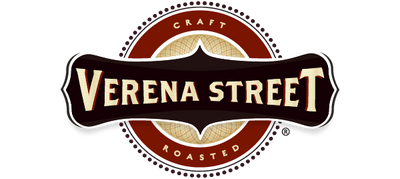Have you ever been enjoying your favorite cup of Verena Street Coffee and wonder, “where did this come from?” Well, we’re here to tell you! The delicious cup of coffee you’re drinking went on quite the journey to end up in your cup. Let’s walk through the bean to cup journey.
Coffee Growing Regions
Coffee plants are grown all over the world. Here at Verena Street, we carry several different origins of coffee, including Washed Brazil, Natural Brazil, Sumatra, Honduras, China, El Salvador, Colombia, Vietnam, Kenya and Peru. Not only is coffee grown in several different regions around the world, but there’s also different types of coffee.
Arabica Coffee
About 60-70% of the world’s coffee production is Arabica coffee. Arabica coffee is grown at higher altitudes, and the coffee plants and beans take longer to mature. When purchasing coffee, you’ll notice that Arabica coffee is more expensive. It’s very popular in high quality, specialty markets.
Robusta Coffee
About 30-40% of the world’s coffee production is Robusta coffee. Robusta coffee is grown at much lower altitudes, and the coffee plants and beans mature much faster than Arabica. These beans are cheaper and very popular in lower quality, commercial markets.
Verena Street coffees consist of only the best 100% Arabica beans. Each cup of our coffee is smoother and better tasting than lower quality commercial coffees.
Verena Street coffee is a staple in our home. - Amy, verified customer
Coffee Cherries
Did you know that coffee plants actually grow fruit called coffee cherries? Now you do! Coffee plants grow cherries that contain 1-2 seeds per cherry. The seeds are green (or unroasted) coffee beans. Coffee cherries are picked once ripe. The fruit is then separated from the beans, and the farmers dry the beans. Once that process is complete, the green beans are ready to be shipped to us!
Arrival to Verena Street
Beans then arrive at our facility. The beans will always arrive as green beans, and we always roast them right here at our facility. Roasting coffee is truly an art as much as it is a science. When we roast coffee beans, it develops the beans’ flavor and aroma. Beans are roasted at different times and temperatures, resulting in light, medium, and dark roast blends. Light roasts are roasted for the shortest amount of time and have the most caffeine. Dark roasts are roasted for the longest amount of time and have the least caffeine. While roasting, the beans will “crack” at about 385 degrees. This “crack” is used to measure how long after the first crack until they reach each roast level. When they crack, the natural oils inside the beans come out and give the coffee its natural flavor. Yum!
Straight from the roaster to my house, I thoroughly enjoyed my first taste of Verena Street coffee. You can really taste the difference in freshly roasted, freshly ground coffee. - Verena, verified customer
Certifications
Besides beans varying in origins, they can also have different certifications.
Rainforest Alliance™ Certified Farms
- We proudly believe in fairness, sustainability, and responsible sourcing
- The Rainforest Alliance™:
- Focuses on social, environmental, & economical sustainability
- Works to conserve biodiversity
- Promotes the rights and well-being of workers, their families, and communities
- Learn more here!
We strongly support the Rainforest Alliance Certification. Way to go, Verena Street! - Jane, verified customer
Fair Trade Certified™
- Designed to overcome poverty
- Empower producers in the poorest countries
- Give producers a guaranteed price for their products
- Iowa Native line is fair trade and organic
- Learn more here!
Recently picked up Farmhouse Breakfast, and it is one of the best coffees I have ever had. Bonus points for making organic coffee! - Amy, verified customer
Swiss Water® Process
- Our beans undergo a natural decaffeination process
- Provides full-bodied flavor without chemicals
- The Process:
- Green beans are soaked & create water that’s charged with flavor and caffeine
- Those beans are then discarded
- The caffeine is then filtered out of the water using carbon filters
- Caffeine-free, flavored water is now the decaffeinating tool
- Batches of green beans are soaked in this water which creates flavorful, decaf coffee
- Learn more here!
I tried Sunday Drive and cannot believe there's no after bite. It's SO smooth! I will not drink anything but Verena Street. - Amber, verified customer
Conclusion
Next time you’re brewing your favorite Verena Street blend, take a moment to appreciate the exciting journey your coffee beans went on to end up in your cup. 😊
Stay Connected
Want more blog content? Click here.
Connect with us on social media! We love hearing from you. Follow us on Instagram and like us on Facebook to stay up to date on all things Verena Street. Leave a like, comment, or share our posts with your friends and family. We appreciate your support!















